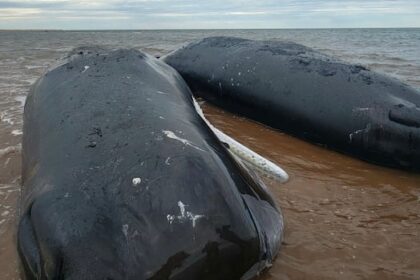‘Misinformation and disinformation won’t go away’Published Apr 06, 2025 • 6 minute readWhen it comes to information sources online, it can be hard to tell what’s legitimate news and what’s misinformation and disinformation. Photo by Stock image /UnsplashThere’s plenty of questionable information flying around the internet at the best of times, but cyberspace can complicate things even further when elections are called.For many, it’s hard to tell fact from fiction. Is that meme true or shared tongue in cheek? Is that video clip of a political leader making an outrageous statement real or created with artificial intelligence (AI)?THIS CONTENT IS RESERVED FOR SUBSCRIBERS ONLY.Subscribe now to access this story and more:Unlimited access to the website and appExclusive access to premium content, newsletters and podcastsFull access to the e-Edition app, an electronic replica of the print edition that you can share, download and comment onEnjoy insights and behind-the-scenes analysis from our award-winning journalistsSupport local journalists and the next generation of journalistsSUBSCRIBE TO UNLOCK MORE ARTICLES.Subscribe or sign in to your account to continue your reading experience.Unlimited access to the website and appExclusive access to premium content, newsletters and podcastsFull access to the e-Edition app, an electronic replica of the print edition that you can share, download and comment onEnjoy insights and behind-the-scenes analysis from our award-winning journalistsSupport local journalists and the next generation of journalistsRegister to unlock more articles.Create an account or sign in to continue your reading experience.Access additional stories every monthShare your thoughts and join the conversation in our commenting communityGet email updates from your favourite authorsSign In or Create an AccountorArticle contentRecommended from Editorial COMMENTARY: A ‘social’ disease: Canadians face new battle with political spin and manipulation ahead of vote LETTER: Frustrated with fake, alternative news Felix Odartey-Wellington, who teaches political communications and media studies at Cape Breton University, said there has never been a greater need for media literacy than today.“The problems with misinformation and disinformation won’t go away,” said Odartey-Wellington. “They existed even before the invention of the printing press.“Think of an ecosystem comprising not just us humans, animals and plants, but also comprising of technology. We need to ask ourselves: how do we co-exist with even benefit from the technology? For example, to access valid knowledge and information.” Felix Odartey-Wellington, who teaches political communications and media studies at Cape Breton University: “The problems with misinformation and disinformation won’t go away.” Photo by ContributedMISINFORMATION VERSUS DISINFORMATIONOdartey-Wellington said it’s important to know the difference between misinformation and disinformation.He says misinformation is inaccurate information that’s shared by someone who believes what they are sharing is true, even when it’s not.Article content“You can have a situation where someone in good faith shares misinformation, but it’s still problematic,” said Odartey-Wellington.Disinformation is information that is false and is shared deliberately. He said both are problematic for democratic processes.“Democracy requires informed citizen participation,” he said. “Ill-informed citizens make poor political choices. Democracy also requires trust between citizens as part of a shared community with shared aspirations.“Regarding elections and misinformation and disinformation, disinformation often aims to erode trust in democratic institutions such as government and mainstream media. It erodes trust in democratic processes such as elections. It also aims to create or amplify social divisions and as a multicultural society, Canada is particularly vulnerable to such attacks.”PUBLIC INQUIRY NEEDEDThe potential of disinformation interfering with elections caused enough concern that the federal government created the Public Inquiry into Foreign Interference in Federal Electoral Processes and Democratic Institutions in 2023.Article contentThe inquiry set out to examine the interference foreign countries may have engaged in and any impact it may have had on the 2019 and 2021 federal elections. It also examined the capacity of federal departments, agencies, institutional structures and governance processes to permit the federal government to detect, deter and counter such interference.“That tells you that at the higher levels of government, there is confirmation that this is a problem,” said Odartey-Wellington. “Without naming names in terms of states because there are different states that may have an interest in this kind of interference, we can’t just think of one foreign state or two. There are multiple that might be invested in this kind of practice.”PUBLIC CONFUSEDAccording to a 2023 survey by Statistics Canada, 43 per cent of Canadians thought it was becoming harder to distinguish between true and false news or information, compared with three years prior. Their statistics from 2022 say 73 per cent of Canadians reported having seen content online that they suspected to be false or inaccurate in the past 12 months.Article contentIn another Statistics Canada survey from 2023, Canadians said they always (17 per cent) or often (36 per cent) fact-check news or information, while only four per cent reported never fact-checking it. But among the 83 per cent of Canadians who do not always fact-check information, half reported a lack of interest or motivation as a reason for not doing so.Another survey by Statistics Canada in 2023 looked at the level of trust in various news or information sources. It found that social media posts by other users were only trusted by seven per cent of respondents, while news organizations were trusted by 37 per cent (25 per cent believed news organizations can’t be trusted, while 39 per cent were neutral). Scientific experts or peer-reviewed journals had the highest level of trust at 68 per cent.But Odartey-Wellington said the more concerning number from that survey was that information from close contacts was trusted by 56 per cent of respondents.Article content“That 56 per cent that trust close contacts can be a vector of misinformation or disinformation,” he said. “The 37 per cent that trust news organizations, that should have been higher because mainstream media are held to a certain standard that makes them somewhat more responsible as compared to other sources of information.“The fact that 25 per cent believe that mainstream media can’t be trusted and 39 per cent are neutral as to whether mainstream media can be trusted or not is, in itself, problematic.”‘FACT CHECK, FACT CHECK AND FACT CHECK AGAIN’As for what people can do to sift through the noise online, Odartey-Wellington said awareness of the potential for misinformation or disinformation is the first step.Secondly, people should realize that disinformation is designed to provoke an emotional response.“If a story sounds alarming or too good to be true, it is even the more reason to check its source,” he said. “Frankly, fact check, fact check and fact check again. There are credible fact checking tools like AFP fact check that you can consult for stories that have been debunked.Article content“Fact checking goes for images as well. The technology allows for the creation of images that look very credible, so again, if something looks really alarming or concerning, it’s more the reason to check.”He said we should also be aware that based on algorithms, digital platforms prioritize information that might interest or resonate with you, so avoid the potential for an echo chamber. He also said media literacy should always apply to both digital and traditional media. Brad Works, who teaches in the journalism and communications department at Holland College in Charlottetown: “If you see something, see if you can find the same information somewhere else.” Photo by Contributed‘WHAT’S FILLING THE VOID?’Brad Works, who teaches in the journalism and communications department at Holland College in Charlottetown, said many people looking to spread disinformation online use tools to resemble legitimate news sources in an attempt to fool unsuspecting readers.“It’s really hard to find reliable news on social media and the Meta block of news in this country doesn’t help,” said Works, who was also a former managing editor of The Guardian and Journal Pioneer in Prince Edward Island.Article content“We have to ask ourselves: what’s filling the void? A lot of people say they’re getting their journalism on social media, but if legitimate, provable journalism is not there, then what are they getting? And who are all these new sources of news and what are these standards?”Works said mainstream media doesn’t get a complete pass. He said they have to do a better job of differentiating between opinion pieces and regular news content.“Media organizations do not do themselves any favour in that regard because for the sake of getting eyeballs on that stuff, a lot of them mix their opinion pieces in with the news, which just confuses people,” he said. “People in a rush might not take the time to discern ‘oh, this one is an opinion piece but the one beside it is a news piece.’”He believes people should question everything they read by going to what they consider a legitimate news source and go to a second legitimate source to see if the facts match.“For instance, if you have the CBC and the National Post with the same set of facts, I think you could be pretty comfortable knowing that’s true,” he said.He also says to think before you share online.“If you see something, see if you can find the same information somewhere else,” said Works. “If you can’t, that should be raising alarm bells for you.”Article content
Election fact or election fiction?











